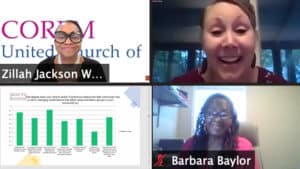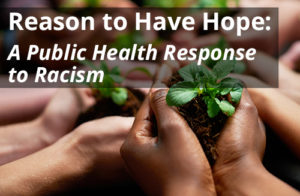Implementation Conversation Offers Tangible Ways for Churches to Advocate for Health Equity and Become Anti-Racist

An implementation conversation held July 17 on the Synod Resolution to Declare and Respond to Racism as a Public Health Crisis drew a virtual crowd of some 50 participants from across the country. Attendees heard from United Black Christians (UBC) board member Barbara Baylor, former convenor of the UCC’s Racial and Ethnic Health Disparities Task Force (REHD); the Rev. Dr. Elyse Berry, CHHSM’s associate for advocacy and leadership development; and Zillah Jackson Wesley, moderator of the UCC’s Council on Racial and Ethnic Ministries (COREM). Together, the three women answered questions and outlined several concrete ways all settings of the church can address elements of the resolution.
In a new process for the UCC’s General Synod, delegates and visitors were invited to attend similar conversations on all of the resolutions passed by Synod delegates. “I really appreciated this time for more conversation on the resolution, and for it to be held during Synod,” said Berry. “Sharing ideas for action and creating space to ask questions and consider what next steps might be was not an afterthought, and I think that matters. People have energy around this, and by meeting during Synod, folks had the ability to engage in a way that they might not have otherwise.”
In welcoming attendees, Wesley explained the genesis of the recently-passed resolution, noting that COREM and CHHSM had each submitted similar resolutions on racism as a public health crisis, and agreed to work together on the single resolution. The partnership has opened the door to further ways to partner in achieving health equity in the future, she said.
Baylor concurred, remarking that with CHHSM and COREM, much can be accomplished in the fight to eradicate racial and ethnic disparities in public health care. She explained her work with the Racial and Ethnic Health Disparities Task Force (REHD) and offered ideas to help local churches tackle health equity issues in their own communities. One of the most important emphases, she said, was creating opportunities for action.
“Think about developing mini-COREM bodies in your community or church, and let them share their stories,” she said. That way, the community can hear all voices, and churches can assemble a divers health equity advocacy group.
She encouraged local churches and conferences to examine the ways in which justice inequities in housing, education, employment, hunger and more affect health. One useful guide is the Unnatural Causes Tool Kit, used in conjunction with the 2009 General Synod Health Care For All Resolution (resolution begins on p. 46 of the link). The kit asks, “Is inequality making us sick?” and offers ways congregations and conferences can begin to address the issues.
“The faith community, in conjunction with health organizations, can make a difference,” Baylor said.
Baylor had presented a 45-minute educational session prior to the vote on the resolution, available to all delegates and visitors, and one that CHHSM’s Berry encouraged everyone to watch. “It’s a 45-minute crash course on public health,” Berry said, that will give Synod goers a solid foundation from which to build their health equity efforts.
During her presentation, Berry outlined ways local churches and conferences can become involved in dismantling the public health crisis of racism. One was via legislative advocacy, including supporting the UCC’s Justice and Witness office in Washington, D.C.’s action alert on Racism as a Public Health Crisis.
“All of the disparities in other justice areas show up in the body and affect public health,” Berry said. “Public health is a benchmark that affects all of the others. It is intersectional.”

Berry also introduced attendees to CHHSM’s in-depth virtual course, Reason to Have Hope: A Public Health Response to Racism. Created in part at the request of the General Synod resolution committee, the 25-section, free resource is user-friendly and self-paced, and is geared for a group learning environment. It includes history, current events, theology, stories of resilience and hope, and the intersections of race and social issues to help members of faith-based organizations and local churches learn from not only the material, but each other.
The course is intended to help participants find how the spirit is speaking to them in addressing health equity issues, Berry said.
Access to health care was one of the issues addressed in the Q&A session following the presentations. “Where you live matters,” said Wesley. For example, “everybody has insurance where I live [Washington, D.C.], but at different levels, so access and treatment is not equitable across the board.”
Baylor reiterated the intersectionality of social inequities. “The choices that one makes are often tied to the choices one has — which is why the faith community needs to work on these issues,” she said. “ALL the factors are health issues. Everything you can do to improve the quality of life is health equity, and the faith community is in a unique position to lead.”
Berry expanded on the role of faith communities in health equity. “This is tied up with liberation for everyone,” she said. “What do we really mean when we say people are inherently beloved, no exceptions, as you are? How do we structure a society that says, ‘You have inherent worth’? This is an urgent life and death situation.”
All three presenters expressed the need for continued partnerships in dealing with the myriad of racial health equity issues.
“What I found most meaningful was having the opportunity to work with Barbara and Zillah. These women are incredible advocates and wise leaders, and I am grateful to learn from and collaborate with them,” said Berry. “The experience of COREM and CHHSM coming together for this shared work is church at its best. We each had our own unique gifts to bring to the table and, with the passing of the resolution, so many more will be joining us.”
Read the text of the resolution and learn about its passage by General Synod delegates July 11.
Learn more about the free Reason to Have Hope online course, and sign up for it.
Sign on to Justice and Witness Ministries Racism as a Public Health Crisis Action Alert.
Learn more about Health Equity in CHHSM’s 9-part Advocacy Toolkit.
Join Our Mailing LIst
"*" indicates required fields
Follow on Facebook
Pension Boards appoints David A. Klassen as its President, CEO - United Church of Christ
www.ucc.org
The Pension Boards, an affiliated ministry of the United Church of Christ recently announced its appointment of David A. Klassen as its next President and